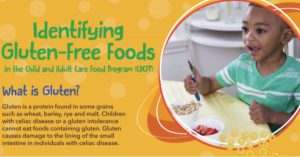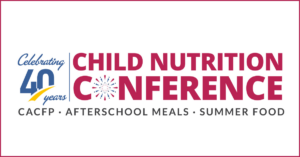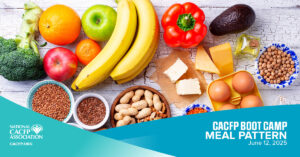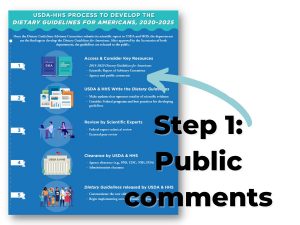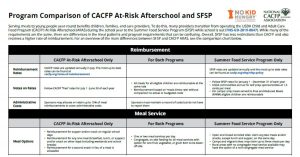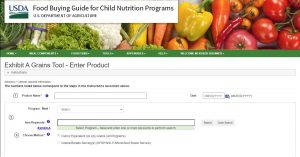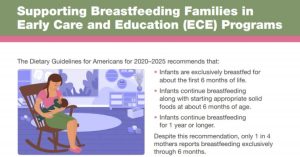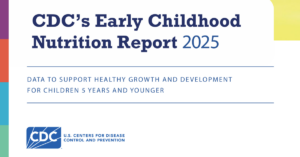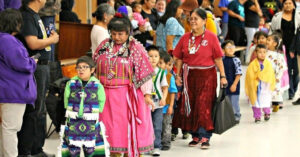Get a rundown on all things happening at NCA this month!
Read MoreUSDA has the authority to waive statutory or regulatory program requirements for Child Nutrition Programs. State Agencies can submit a 12(l) waiver application to USDA in order to allow for flexibilities, including off-site monitoring, in their state. In Fiscal Year 2025, at least nine States have applied and been approved for an off-site monitoring waiver.
Read MoreIf a grain product list enriched grains as the first ingredient, is the product creditable in the CACFP?
Read MoreLearn how to identify gluten-free foods and get a yummy gluten-free snack recipe.
Read MoreA recent study by our partners at Child Care Aware® of America reveals that parents across the nation are struggling to find affordable, high-quality child care. The survey shows that parents are piecing together multiple care arrangements and facing challenges balancing work and caregiving.
Read MoreCan a mixed age group of 1- and 2-year-olds all be served unflavored 1% milk in the CACFP?
Read MoreThe National CACFP Association (NCA) proudly announces the 2026 National Child Nutrition Conference (NCNC26), celebrating 40 years of advancing nutrition in child and adult care settings across the country.
Read MoreThe National CACFP Association (NCA) is reaffirming its commitment to continuing education by offering a variety of virtual training opportunities that support child nutrition professionals at every stage of their careers.
Read MoreServing reimbursable meals begins with a solid understanding of the CACFP meal pattern. Learn more with our Meal Pattern Boot Camp!
Read MoreGet a rundown on all things happening in May at NCA. Annual Training is happening this month. Don’t miss out!
Read MoreWe’re bringing you workshops on nutrition, program administration, operations, financial and nonprofit management, and more.
Read MoreTAKE ACTION NOW to support increased reimbursement for CACFP and the extension of the area eligibility waiver for family childcare homes. Call your Senators TODAY, then call your House Member and urge them to “Vote Yes” on the Keep Kids Fed Act, which will provide much-needed relief to providers and families across the country
Read MoreThis memorandum provides clarification on questions
related to the collection of race or ethnicity data now that
visual identification of race and ethnicity is no longer an
allowable practice in the Summer Food Service Program
(SFSP) and Child and Adult Care Food Program
(CACFP).
FNS is offering a suite of operational flexibilities that will be available to child nutrition programs for summer 2022 and school year 2022-23.
Read MoreThis memo provides guidance to State agencies as they transition from COVID-19 nationwide waivers related to establishment of area eligibility in the child nutrition programs, including CACFP, for summer 2022 and school year 2022-2023. Child Adult Care Food Program operators must use data from October 2019, unless the National School Lunch State agency elects a month other than October to establish area eligibility.
Read MoreEffective May 5th, 2022, USDA released updated Nondiscrimination Statement Guidance. As a result of recent Supreme Court decision, State agencies and program operators must use the new updated nondiscrimination statement and new “And Justice for All” poster.
Read MoreAs the first step in the development process of the Dietary Guidelines for Americans, 2025-2030, the USDA is releasing proposed scientific questions for public comment.
Read MoreThe Child and Adult Care Food Program has new creditable foods listed on the USDA Food Buying Guide! If you are new to the FBG, this interactive tool allows for easy display, search, and navigation of food yield information. In addition, users can compare yield information, create a favorite foods list, and access tools, such as the Recipe Analysis Workbook (RAW) and the Product Formulation Statement Workbook.
Read MoreThe Child and Adult Care Food Program community asked for more Spanish resources to be available on the National CACFP Sponsors Association website and we heard you! Available now in Spanish are more resources to help sponsors and providers with meal pattern requirements, best practices, and so much more!
Read MoreServing meals to young people year-round benefits children, families, and care providers. To do this, many providers transition from operating the USDA Child and Adult Care Food Program (CACFP) At-Risk Afterschool (ARAS) during the school year to the Summer Food Service Program (SFSP) while school is out. For an overview of the main differences between SFSP and CACFP ARAS, see the comparison chart below.
Read MoreNCA understands that the end of flexibilities will cause challenges for many CACFP sponsors and providers and we commend your continued commitment to providing nutritious meals and snacks to the children or adults in your care. In preparation for the end of the additional reimbursement, we have collected the following resources to help you successfully provide meals even if your available budget decreases.
Read MoreCDC created three new fact sheets for Early Care and Education (ECE) providers about Early Child Nutrition and Feeding. The fact sheets offer tips and best practices for supporting breastfeeding families, information about safe storage and handling of breastmilk, and strategies for introducing solid foods.
Read MoreIf a grain product list enriched grains as the first ingredient, is the product creditable in the CACFP?
Read MoreCan a mixed age group of 1- and 2-year-olds all be served unflavored 1% milk in the CACFP?
Read MoreAre vegetable spirals creditable in the CACFP?
Read MoreCan a provider serve yogurt that they have frozen?
Read MoreCan a pureed vegetable that is mixed into a dish credit towards the meal pattern?
Read MoreAre dehydrated vegetables creditable in the CACFP?
Read MoreThe Child and Adult Care Food Program has new creditable foods listed on the USDA Food Buying Guide! If you are new to the FBG, this interactive tool allows for easy display, search, and navigation of food yield information. In addition, users can compare yield information, create a favorite foods list, and access tools, such as the Recipe Analysis Workbook (RAW) and the Product Formulation Statement Workbook.
Read MoreThe Child and Adult Care Food Program community asked for more Spanish resources to be available on the National CACFP Sponsors Association website and we heard you! Available now in Spanish are more resources to help sponsors and providers with meal pattern requirements, best practices, and so much more!
Read MoreServing meals to young people year-round benefits children, families, and care providers. To do this, many providers transition from operating the USDA Child and Adult Care Food Program (CACFP) At-Risk Afterschool (ARAS) during the school year to the Summer Food Service Program (SFSP) while school is out. For an overview of the main differences between SFSP and CACFP ARAS, see the comparison chart below.
Read MoreNCA understands that the end of flexibilities will cause challenges for many CACFP sponsors and providers and we commend your continued commitment to providing nutritious meals and snacks to the children or adults in your care. In preparation for the end of the additional reimbursement, we have collected the following resources to help you successfully provide meals even if your available budget decreases.
Read MoreCDC created three new fact sheets for Early Care and Education (ECE) providers about Early Child Nutrition and Feeding. The fact sheets offer tips and best practices for supporting breastfeeding families, information about safe storage and handling of breastmilk, and strategies for introducing solid foods.
Read MoreA recent study by our partners at Child Care Aware® of America reveals that parents across the nation are struggling to find affordable, high-quality child care. The survey shows that parents are piecing together multiple care arrangements and facing challenges balancing work and caregiving.
Read MoreThe CDC’s 2025 Early Childhood Nutrition Report gives us a big-picture look at how young children in the U.S. are eating and growing. It focuses on kids from birth to age 5 and shares important facts about breastfeeding, starting solid foods, eating healthy and how states support good nutrition.
Read MoreThe “Characteristics of Emergency Shelters Participating in the CACFP” study by USDA seeks to better understand the characteristics of CACFP emergency shelters, who they serve, how CACFP fits into their operations, and their challenges with CACFP. The study was conducted in 2023 and collected data from 242 emergency shelters that participate in CACFP in Fiscal Year 2023.
Read MoreA survey was administered in the spring of 2023 of licensed California family child care homes (FCCH) to assess the perceived impacts of the increased reimbursement during the Covid-19 pandemic on CACFP participation and anticipated challenges with reinstated tiered rates.
Read MoreThe USDA recently released a study on the “Characteristics of Adult Day Care Centers that Participate in the USDA’s Child and Adult Care Food Program” which seeks to better understand key characteristics of adult day care centers participating in CACFP.
Read MoreUSDA released a survey report focused on SFSP and SSO sponsors who operated the non-congregate meal service option in qualifying rural areas in summer 2023.
Read More



